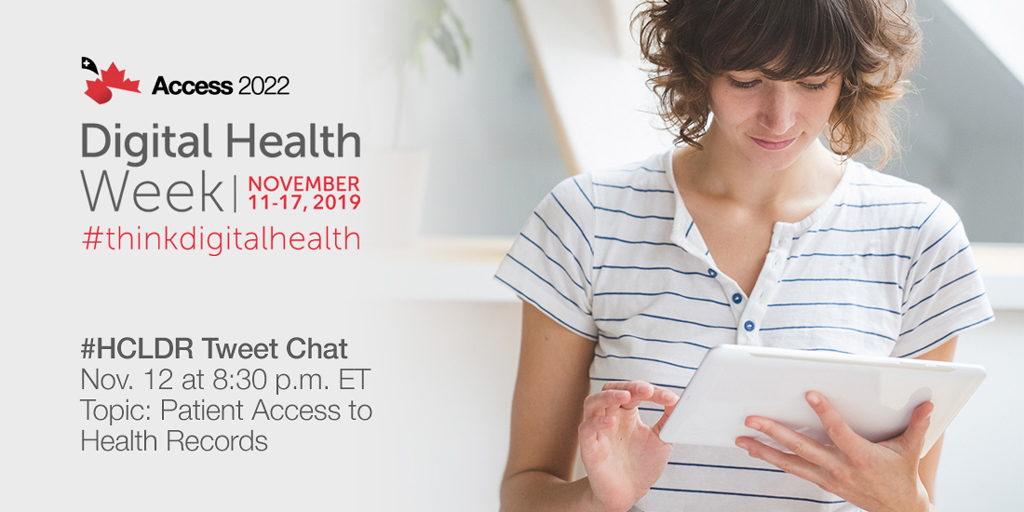Ouch. But when was her last tetanus shot?
“I couldn’t remember,” Katie says. “There was no way to check, so I came home.”
There was no way to check, so I came home. As the day wore on, that stuck with me. What if she’d had her own health information at hand? How can she make informed, appropriate decisions about her care without it?
In 2019, 20 per cent of Canadians digitally accessed their health records, nearly double the year before. Just this year, MySaskHealthRecord launched in Saskatchewan with the support of Canada Health Infoway. This secure website allows eligible Saskatchewan residents safe, secure access to their personal health information.
Other provinces and territories are moving in the same direction, aligning with a definite interest from citizens. Across the country, eight in ten Canadians expressed interest in accessing their health information electronically in 2019.
Clearly, there’s an appetite for access, but is scrolling through your lab results a recipe for needless worry? Not according to a recent study. Canadians with access to their health information through a patient portal reported that their anxiety dropped, particularly with respect to managing chronic conditions. They felt more knowledgeable about their health, and more confident in managing it.
Knowledgeable, confident patients are engaged patients. It’s a part of a gradual cultural shift in health care: from a more paternalistic model, towards one that embraces patients as partners in their own care.
Clinicians experience some benefits too. Fewer requests for lab results and other health information may lighten our administrative, paperwork burden, potentially freeing up time to spend with patients.
Back to Katie. Even in the woods, she was online — just like 90 per cent of Canadian households. “If the data was on my phone, it would have been fine,” she says. Remote location is just one barrier alleviated by digital tools. Online access also benefits patients with mobility considerations, including senior Canadians — the fastest-growing group of internet users.
The patient journey shouldn’t be just a shuffle between clinics, it can be a journey towards empowerment. And the basis of that journey — the first step on the trail — is safe, secure access to your health information. After all, at some point in our lives, we are all patients.
How has patient access to personal health information impacted your experiences with managing care? We would love to hear your thoughts. Join me (@DrRBhyat) for the weekly #HCLDR TweetChat on Tuesday, November 12 at 8:30 p.m. ET (for your local time click here) during Digital Health Week. We will be discussing the following topics:
- T1 Do you have access to your health record — how has having access or not having access impacted your ability to manage your own care?
- T2 One of the concerns often raised about online access to health records is that it will negatively impact people who may not be tech savvy or who are financially disadvantaged. What do you think about these concerns?
- T3 Besides access to their records, what other digitally-enabled health service should be a priority for patients?
- T4 If health data is universally accessible by patients, providers, payers with proper security and authorization...how would healthcare be different?
Have a comment about this post? We’d love to hear from you.
References
Canada Health Infoway, “Access Health Survey Summary Report: 2019,” to be published November 2019 https://www.infoway-inforoute.ca/
Canada Health Infoway, “Positive Patient Experience Yields Health Care Benefits,” 7 March 2017, accessed 29 October 2019
Canada Health Infoway, “Valuing Canadians’ Secure Access to their Health Information and Digital Health eServices,” July 2018, https://www.infoway-inforoute.ca/en/component/edocman/3552-valuing-canadians-secure-access-to-their-health-information-and-digital-health-eservices/view-document?Itemid=101, accessed 21 October 2019
Canadian Internet Registration Authority, “2019 Canada’s Internet Factbook,” April 2019, https://cira.ca/resources/corporate/factbook/canadas-internet-factbook-2019, accessed October 28, 2019
Mehta, S., Jamieson, T., and Ackery, A.D. “Helping clinicians and patients navigate electronic patient portals: ethical and legal principles,” CMAJ, 7 October 2019, https://www.cmaj.ca/content/191/40/E1100, accessed October 23 2019
Saitz, Ray. “Canadian internet usage is at 90%,” Peterborough Examiner, 18 January 2019, https://www.thepeterboroughexaminer.com/life/2018/01/18/canadian-internet-usage-is-at-90.html, accessed 23 October 2019
Social Research and Demonstration Corporation, “Impacts of Direct Patient Access to Laboratory Results,” August 2015, https://www.infoway-inforoute.ca/en/component/edocman/2775-impacts-of-direct-patient-access-to-laboratory-results-final-report/view-document?Itemid=101, accessed 22 October 2019






